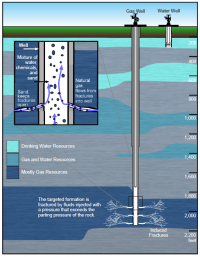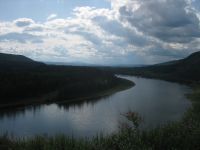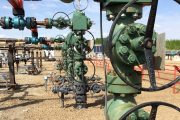On Tuesday, Quebec's Bureau d'audiences publiques sur l'environnement (BAPE) recommended a pause on hydraulic fracturing for shale gas in the province until the potential health and environmental impacts are better understood. Shortly after that release, the Quebec government concurred.
The main reason cited for the pause is that the gaps in understanding the impacts of "fracking" are significant. As reported in the Montreal Gazette, the BAPE report found that "for certain fundamental questions, the answers are only partial or nonexistent."
In the face of such uncertainty for something as fundamental as clean water, it seems entirely reasonable that the government and citizens of Quebec would want more information before making a decision about the place — if any — shale gas should have in Quebec's economy. The provincial government still clearly wants to find a way to develop the industry, but they deserve credit for not rushing into the decision blindly.
 The questions and gaps are similar to those being addressed by a U.S. Environmental Protection Agency (EPA) study that is scheduled for completion in 2012. According to the study's research plan:
The questions and gaps are similar to those being addressed by a U.S. Environmental Protection Agency (EPA) study that is scheduled for completion in 2012. According to the study's research plan:
The overarching goal of this research is to answer the following questions:
- Can hydraulic fracturing impact drinking water resources?
- If so, what are the conditions associated with the potential impacts on drinking water resources due to hydraulic fracturing activities?
And that's not to say that concerns about drinking water are the only gaps. The same study plan goes on to say:
EPA recognizes that there are important potential research areas related to hydraulic fracturing other than those involving drinking water resources, including effects on air quality, aquatic and terrestrial ecosystem impacts, seismic risks, public safety concerns, occupational risks, and economic impacts. These topics are outside the scope of the current study, but should be examined in the future.
With these fundamental gaps, it's encouraging to see the EPA at least studying them and Quebec going a step further to prevent any hydraulic fracturing until the gaps are addressed. Hopefully they will be given the scope, resources and independence to provide satisfactory answers to the questions they've been asked to address.
What about British Columbia?
The debate about "gaz de schiste" (the French term for shale gas) in Quebec has now culminated in Tuesday's announcement. Yet in B.C. the issue has hardly been on the public agenda. There has been surprisingly little conversation about the implications of hydraulic fracturing for B.C. The province's northeast is already seeing significant hydraulic fracturing activity in the Horn River and Montney Basins. According to a report from B.C.'s Oil and Gas Commission, the oil and gas sector was permitted to use (and contaminate) 86 billion litres of freshwater in 2009 alone. And by most accounts, industry activity and water use is projected to increase substantially in the coming years.
 Serious concerns exist about substantial water withdrawals by the industry. As more information comes to light, it is clear that the gas industry is drawing water from lakes, ponds, streams and pits throughout the northeast through various arrangements with government and private landowners. There are also real questions about the adequacy of oversight by B.C.'s Oil and Gas Commission, and concerns about the government's lack of understanding of our groundwater resources — both documented in 2010 reports by the B.C. Auditor General. And when the B.C. Auditor General is asking these questions, we need to pay attention and call on government to find answers.
Serious concerns exist about substantial water withdrawals by the industry. As more information comes to light, it is clear that the gas industry is drawing water from lakes, ponds, streams and pits throughout the northeast through various arrangements with government and private landowners. There are also real questions about the adequacy of oversight by B.C.'s Oil and Gas Commission, and concerns about the government's lack of understanding of our groundwater resources — both documented in 2010 reports by the B.C. Auditor General. And when the B.C. Auditor General is asking these questions, we need to pay attention and call on government to find answers.
Similar concerns about the industry's impact on the province's water resources and the gaps in the province's laws and regulation have been raised by the Pacific Institute for Climate Solutions, the University of Toronto and ourselves. To date, those concerns remain unaddressed in B.C. and the same questions, for which only partial or nonexistent answers are available in Quebec and the U.S., are just as relevant in B.C.
B.C. should be seriously asking the same questions about the risks of future shale gas development in the province. Just as importantly, the government should be willing to listen to the answers and adjust course accordingly.





